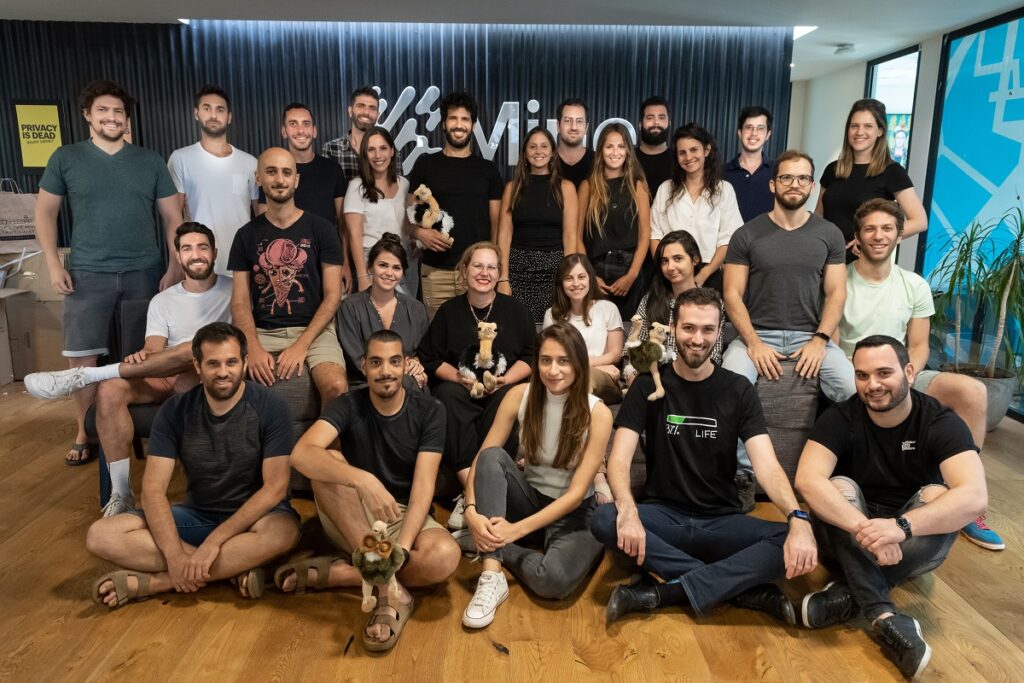Since emerging from stealth mode in early 2020, Mine has grown from 35,000 users in six countries to over one million all over the world in just a year and a half. And a lot of that happened organically, by word of mouth.
“If you go on Twitter and search for saymine.com, you will see hundreds of people sharing Mine with friends, talking about surveys, discussing the benefits, and conveying how they discovered us. Users are very curious about our product and they don’t want to lose control. They want to know they have control of their data,” Mine co-founder and CEO Gal Ringel tells NoCamels.
Mine has made the process to reclaim your data even easier, with just a click of a button. They’ve even taken it one step further to help companies with their deletion requests.
“Companies that started to receive our user deletion requests began to reach out to Mine directly and say, ‘Mine we started to get deletion requests from your users. We love what you’re doing, we understand the vision. We’ve even used it ourselves as the employees of the companies.’ And they started asking if we can help them. We asked, ‘Don’t you know how to handle the requests?’ And the answer was no.”
SEE ALSO: All Mine: Israeli Data Privacy Startup Want Users To Reclaim Their Data
When a company receives a deletion request, a representative of the company needs to go in and manually delete each request by one. Mine learned that these companies were compliant with privacy measures, but they were still having difficulty handling the requests at scale because they were time-consuming.
“We said, ‘We can help you,’ and we actually developed a no-code automated layer for companies where anytime they got a privacy request, the Mine product handled it automatically. We implemented APIs to any data source or any SaaS service where a company can keep customers’ data. So companies add that code to any company source — it can be an email marketing system, HubSpot, Zendesk, your CRM, Google Analytics — and Mine handles it.”
Mine’s platform assists users in reclaiming their personal data and empowers the user to discover his or her digital footprint while also supporting them in their efforts to take it back. The company was founded by current-CEO Ringel, current-CTO Gal Golan, and current-CPO, Kobi Nissan, all of whom had to deal with a cyber attack prior to founding the firm. One had his financial data stolen, one had to deal with reputation damage, and the third had a parent that dealt with identity theft.
Two years ago, as the coronavirus pandemic reared its ugly head, initial figures reported by Forbes in 2020 showed that internet usage had surged as much as 70 percent. As existing tech trends accelerated, enterprises went remote, and more people shopped, streamed, gamed, and socialized online, internet hits continued to spike in 2021 and 2022.
But so did cyber attacks and data breaches. With at least 60 percent of the world’s population now online, scoring someone’s personal online data became easier than ever. In an EasyJet breach in May 2020, as many as nine million customers of the low-cost British airline were targeted in a complex attack that stole names, emails, and credit card information. And in August 2021, mobile carrier T-Mobile was rocked by yet another massive data breach, which became the company’s fifth one in just five years. The numbers were staggering as the personal data of more than 47 million people was exposed in the attack.
Despite the sophisticated attacks, three thousand Easy Jet customers and 1,000 T-Mobile customers were able to avoid those breaches entirely, thanks to Mine, the Israeli startup using AI to help users to reclaim their data before it falls into the wrong hands.
Sign up for our free weekly newsletter
Subscribe
“Three thousand users used Mine to discover that they used EasyJet a few years back and are not using them at the moment, so they decided to delete their EasyJet account, because it was unused and, keeping their data for no reason. And a few months later that that breach happened,” Ringel explains, “So we actually saved the data of 3,000 users, including their passport information, and we keep their financial information from being leaked to the dark web.” They were also able to save 1,000 T-Mobile users in the same way.
“To date, we’ve saved more than 150,000 users from a data breach, because they’ve used Mine to identify their data, they found companies holding their data, and they deleted those accounts. Then those companies got breached a week, a month, a few months later. So we actually saved the data from being part of that database,” says Ringel.
“What I’m proud of is that every day I wake up knowing that individuals that are using our product can make their digital life safer,” he adds.
Reclaim your data
In 2020, when I first wrote about the product, I signed on to learn that over 300 companies, brands, and websites had my personal information on file. Almost two years later, and without exercising my right to be forgotten, a whopping 678 companies currently hold my information. (Think of all that online shopping, social media, and other content I’ve consumed since 2020, and of all those large companies that held on to my credit card information without me even remembering that I had supplied it.)
Ringel doesn’t bat an eyelash. “When COVID happened, consumer behavior is changed. We had to move our entire offline life to online. We couldn’t go to the nearest grocery store. And that enabled a lot of people to share more of their personal data because they wanted to sign up for a lot of new services. We purchased more online. So if before COVID-19, the average amount of companies listed per person was 300 to 350, it went way up. Worldwide.”

Mine has two business models, Ringel says. The company has begun to roll out a subscription offering for consumers to better manage their personal data, but it is still mainly free for individuals. It has also started to provide companies with that no-code automation layer mentioned earlier, to handle privacy operation activities.
. In the meantime, it remains one of the fastest and easiest ways to find and delete personal data in seconds. In comparison, GDPR (General Data Protection Regulation) requests take about one month and CCPA (California Consumer Privacy Act) requests can take as many as 90 days. (45 days verify consumer’s identity with an option to extend.)

It’s already been five years since the GDPR law went into effect in Europe, where Mine got its start. Data privacy remains an issue of concern, so much so that an international day has been devoted to awareness of data protection. (Data Privacy Day occurred on Friday, January 28.)
Meanwhile, Mine has continued to make great strides in data privacy in half the time. The non-intrusive machine learning tech platform has raised $9.5 million in a Series A round, led by Google’s AI-focused venture fund, Gradient Ventures, with plans to raise more soon. They were also one of nine startups to graduate from the Intel Ignite startup growth program.
GDPR was definitely a pioneer in pushing the entire privacy market forward, says Ringel, “but I’d like to think that’s what so unique about our product that we were and still are a market leader — the first company to help you manage your personal data on an ongoing basis to avoid digital risk.”
Related posts

Editors’ & Readers’ Choice: 10 Favorite NoCamels Articles

Forward Facing: What Does The Future Hold For Israeli High-Tech?

Impact Innovation: Israeli Startups That Could Shape Our Future




Facebook comments